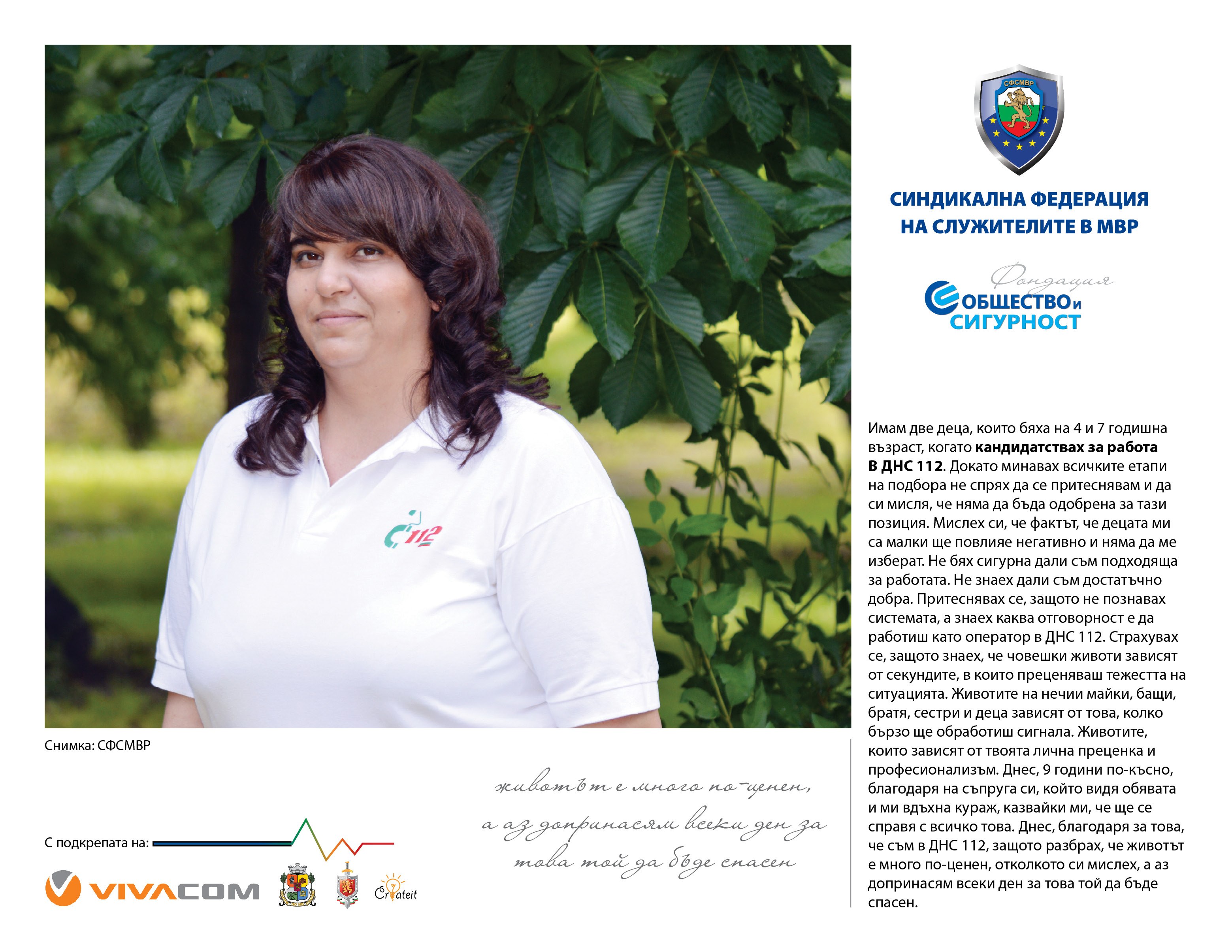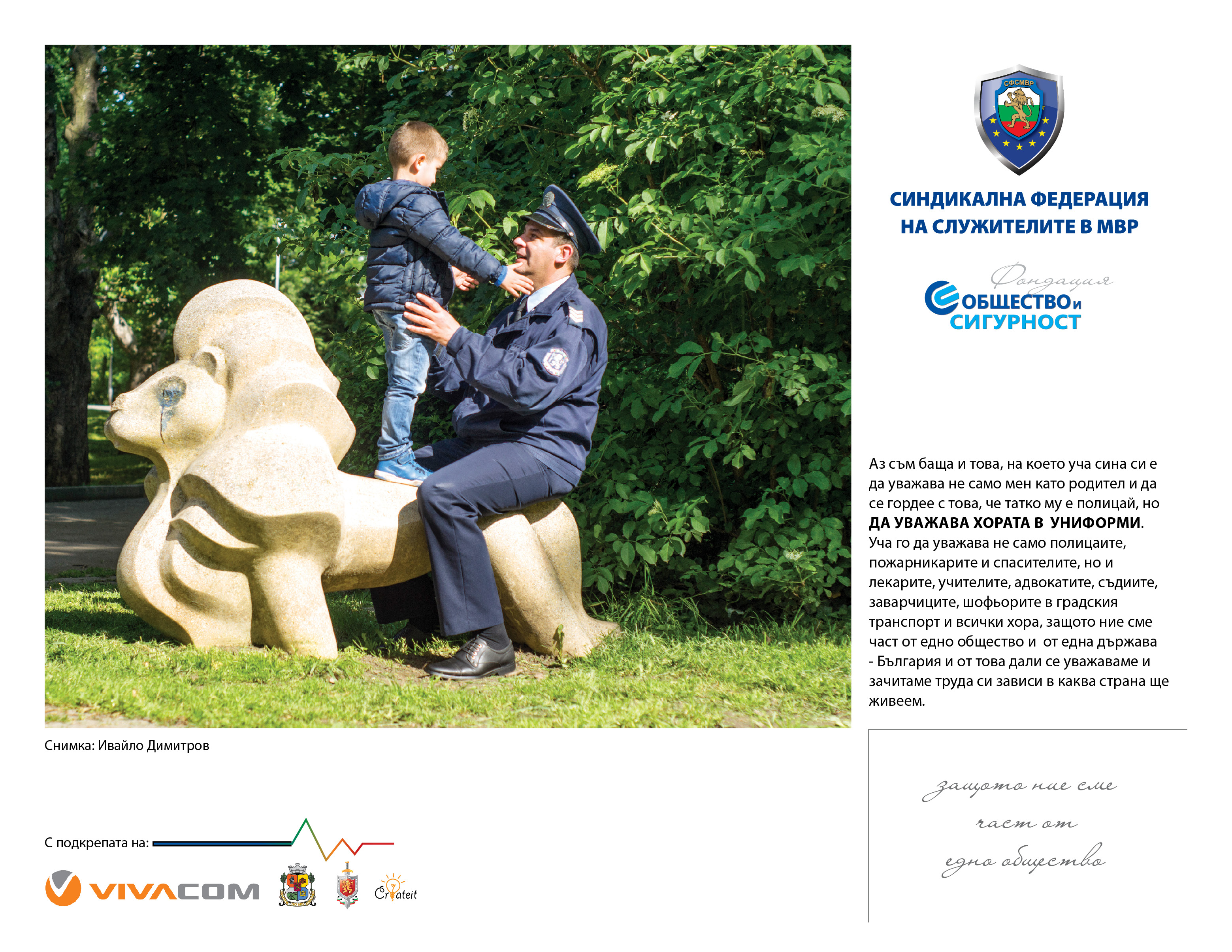- 01.09.2016
The detained foreigners in Bulgaria…
- 01.09.2016
I work in National System 112
I have two children who were 4 and 7 years old when I applied for a job in the 112 Emergency line in Bulgaria. While I was passing all phases of the recruitment I worried and was sure I will not be approved for this position. I thought that my…
- 19.07.2016
I am a father!
“I am a father and teach my son to be proud of and respect not only me as a police officer, but to respect the all people in uniforms. I teach him to respect not only the police, firefighters and rescuers, but also doctors, teachers, lawyers, judges, welders, drivers in…
- 19.07.2016
I am a mother!
“I am a mother and my daughter is very proud that I’m a police woman. She knows that I look out not only for her safety and security, but also for her friends in kindergarten. What she doesn’t known is that I am dreaming for the day when the system will be…
- 19.07.2016
We, the Bulgarians!
“Do you know, we all Bulgarians, are sad people. We taunt the police, sing humiliating songs about police officers, spit it out and caricature the system, and when we are in trouble precisely the police officer is the only one who can help and immediately we are changing the attitudes…
- 01.04.2016
There are days…
Each day is different. There are days I’d been shouted. Days when people fainted in my arms. Days when my stripes had been torn and people spat in my face. Days, I’ve heard and seen how the life vanished. Days like these are not uncommon, but are quickly forgotten, because…
- 30.03.2016
Managing traumatic stress: Coping with terrorism
Terrorism threatens a society by instilling fear and helplessness in its citizens. It seeks to hold a society or government hostage by fear of destruction and harm. When terrorist acts occur, people generally look for ways to cope with the acute stress and trauma. Terrorism evokes a fundamental fear of…
- 15.02.2016
Let’s talk about Ministry of Interior by facts
In 2015, 3168 people have left the Ministry of Interior. More than 2/3 of them are working at field and are at operational positions. From all employees quit the system 1 is a senior, 466 are managers, 688 of are at executive and 2013 are at junior executive positions. 444…
- 15.01.2016
Official position of the Society and Safety Foundation about the Minister of Interior’s statement
Society and Safety Foundation is one of the few civil organizations in Bulgaria which puts as a priority on its activities the improvement of the “civil security” service provided by the Ministry of Interior, which is directly linked with the improvement of the quality of work and working conditions in the MoI’s system. Regarding…
- 13.02.2015
How do we see the participation of civil and professional organizations in Ministry of Interior’s reforming?
The most important element of the whole process is institutionalized of forms and procedures for citizen participation in reforming the Ministry of Interior. The second crucial component is uniting around the need to prepare a long-term strategy to reform the Ministry of Interior, to be adopted as the Ministry of…
- 03.02.2015
Citizen participation in MI: Mission (im) possible!
The main issue which united representatives of trade unions, professional organizations and NGOs in terms of public order and security, is that the “security” service provided to citizens, is not effective and does not meet their needs. The discussion about the parameters and expectations of what should the service be…
- 03.02.2015
The failed reform!
Ministry of Interior is the only unreformed Ministry in Bulgaria, but also one of the ministries in which structural changes are the most numerous. One of the major structural changes that contribute the MoI to become a mega-ministry is the closure of Ministry of Emergency Situations and merger it with…



